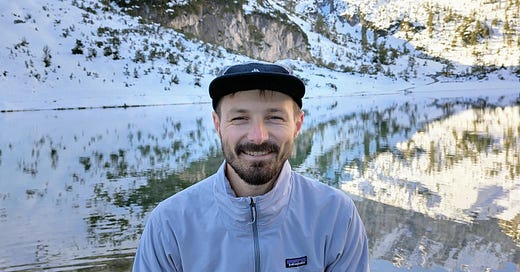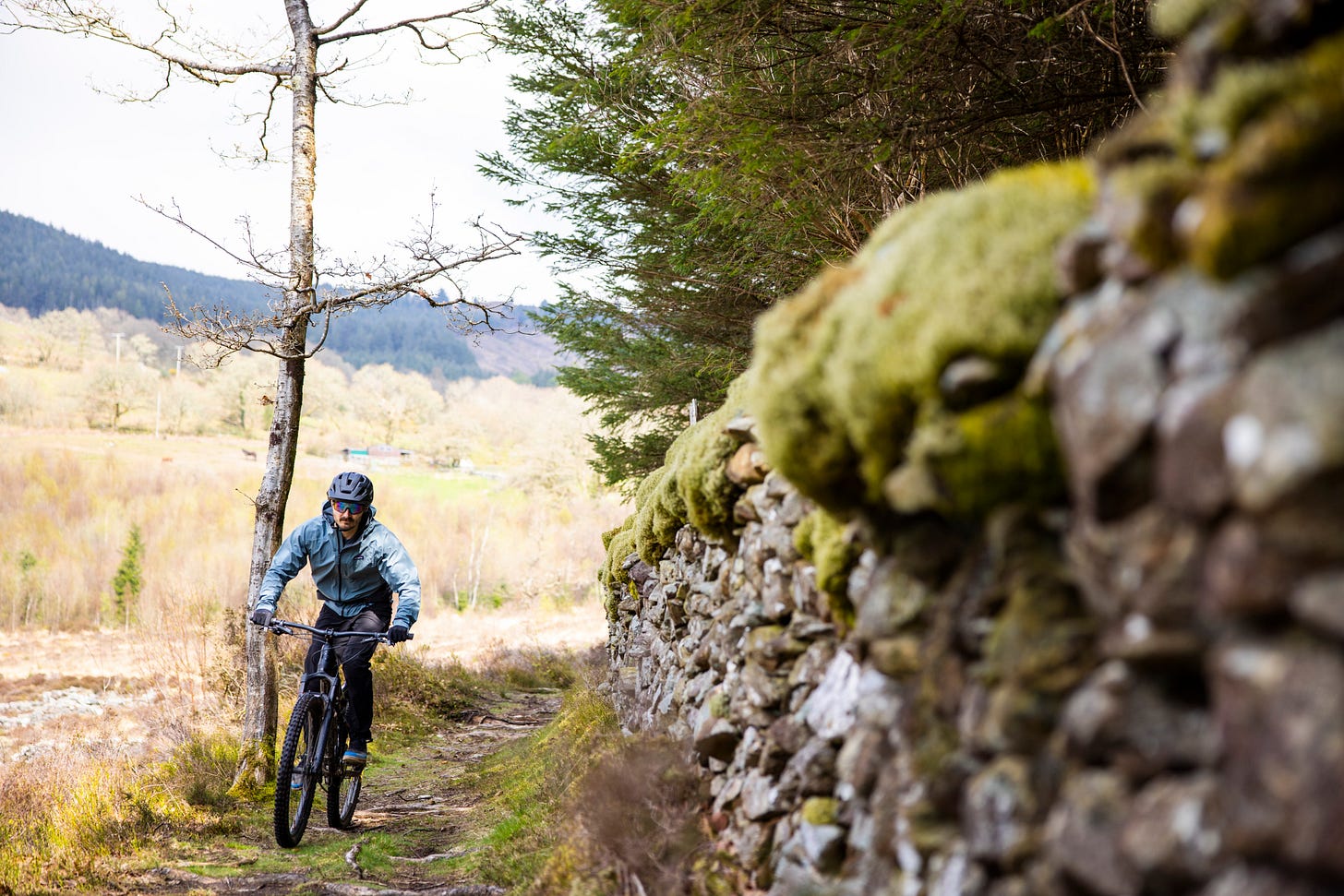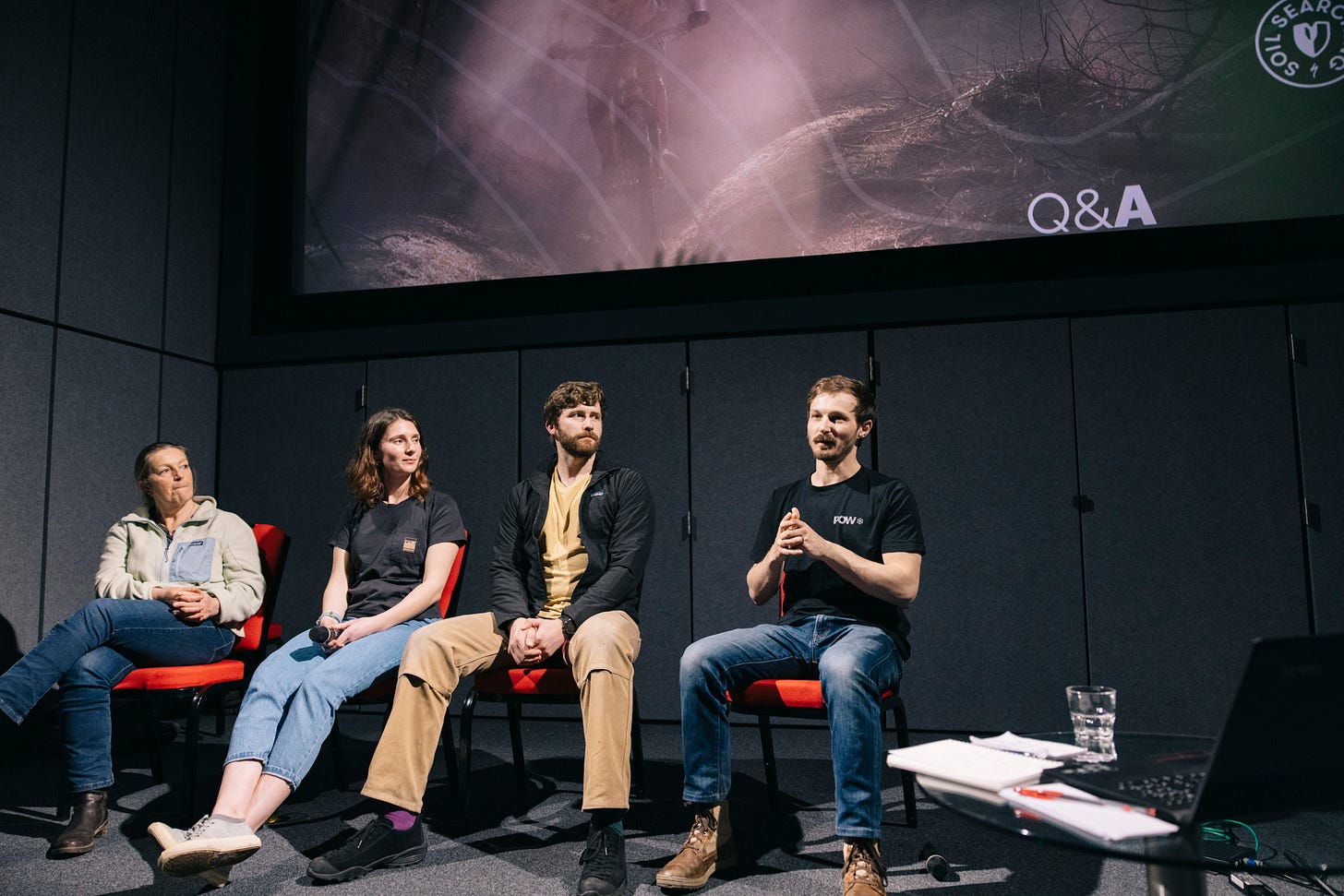“Athletes have potential to be the most effective messengers.”
An interview with Dom Winter, head of Policy & Advocacy at Protect Our Winters UK
“[Athletes] tell a real, trusted personal story about the changes they're seeing and how it's directly impacting them, which is really powerful and leads to building common ground and overcoming unhelpful narratives. Our own surveys show that athletes really cut through and have the potential to be the most effective and trusted messengers by far on climate, compared to politicians or scientists.”
I’ve long been a fan of Protect Our Winters, the climate advocacy group set up by the snowboarder Jeremy Jones, which seeks to mobilise those of us who love the outdoors to take action on the environment. POW UK’s Lauren MacCallum was one of my first newsletter interviewees and this week I spoke to Dom Winter, head of Policy & Advocacy at the charity.
I’ve seen Dom speak on lots of panels over the years and he always has great insight on these issues backed up by solid scientific facts, and I always find I learn something new from these sessions. We chat about his unlikely activist heritage, how all is not lost with Trump getting in, Just Stop Oil and how global heating is affecting the Olympics. Enjoy!
Hey Dom, how’s it going?
Good thanks. I was down your way recently at the Lewes Bonfire Festival as one of my friends is from around there. They had effigies of Farage and the water pollution scandal and the postmaster scandal. I didn’t see a Trump one, maybe that was too obvious. Two of my ancestors were in the Gunpowder Plot actually on Guy Fawkes’s side, planning to blow up the Houses of Parliament.
Wow, no way!
Yeah, I think they're more extreme on the activism side than me haha.
How worried should we be about climate rollback when Trump starts his term? I’ve been thinking how the environmental message has shifted from individual responsibility to your vote is the most important thing. But what do you tell people when voting brings this?
So initially, in terms of dealing with what the implications are – it will have a negative impact on the climate – the estimates are for several billion more tonnes of greenhouse gas emissions because of it. But within that five year term, they may struggle to reverse some policies such as the Inflation Reduction Act, which is already having positive impacts and states might not want that to reverse. Plus, in terms of [licensing] oil rigs and developments, these things take a long time to build, so they might not all come to fruition during that term. It’s definitely a setback, but then the rest of the world continues.
And as an individual, if you didn't get what you voted for by joining climate-led movements, you can still show a strength of demand to politicians. As long as they see that the majority of people want more ambitious action, then that will be the point at which we can win this politically. We need to come back even stronger next time with everyone wanting strong climate action.
And how are things looking from a UK perspective?
The new government is committed to no longer granting new licenses for fossil fuel extraction, which is really good news, and that gives us the opportunity to lead on that globally and support something like the Fossil Fuel Non Proliferation Treaty (here’s a petition for that) and really push for everyone to do it.
Committing to 100% renewable electricity by 2030 is really bold too, so that’s two big wins. Polls around most of the world, and certainly in the UK, show that people back climate action but one of the big issues that conflicts with that is the voice of vested interests.
There was that leaked Trump interview where he’s talking to fossil fuel companies and basically saying if you give me a big donation you can do what you want. In the UK we have Fossil Free Parliament, where they're trying to say no politicians should be taking donations from fossil fuel companies.
But there’s also the opportunity to overcome those voices and use companies as a voice for good. We’ve done that with POW and the outdoor industry. People are seeing the impacts of these floods, fires and so on and using that voice and showing there are even greater negative economic impacts if you don't act. Writing open letters to the government or to other companies and helping push for action.
How do you keep climate out of the culture wars?
Negative press around net zero, constantly saying it will cost us too much, are very dubious. We overcome that through building common ground and having good conversations about it with people, especially those who have that love of the outdoors in common.
You wrote an interesting blog this summer on the Climate Changing Olympics and how the climate crisis is crashing the Olympic party. When you were researching that, which stats stood out most?
I wrote it before the Games but then you had that heavy rain at the opening ceremony, which really put a dampener on the start and caused the rainwater to wash pollution into the River Seine and then it got really hot. There is so much evidence already on the health impacts of extreme heat and water pollution, but I was surprised to see it play out so immediately.
I guess we’re more used to seeing these visible impacts in the Winter Games. And there is also the role played by fossil fuel/polluting sponsors and sportswashing, as outlined in the Olympic Smoke Rings report. Air France, Toyota and ArceleorMittal – all key sponsors of Paris 2024 – were flagged for their poor environmental records.
And how spectator growth is up 440%. I was surprised to see an article in Bloomberg on that topic, which suggested a ban on non-local spectators to Olympic Games.
Which could also be a way of boosting local support for the Games, at a time when the IOC are struggling to find host cities
That was another interesting thing I found out from doing the research for that article. The original Greek Olympics eventually failed because they got too expensive, and no one really wanted to sponsor it.
The IOC have recently posted accepting a new study showing how damaging climate change is to the Winter Games. Future summer and winter Olympic hosts will be required by the IOC to minimise their related carbon emissions, strive to remove more carbon from the atmosphere than they emit, and use their influence to encourage stakeholders to take climate action... but only from 2030 - why so late when emissions are already meant to have been halved by then!
In the Milan Cortina Olympics, POW Italy says the infrastructure being built is too focused on cars, is 250% over on cost, and has little planning on how it will create legacy benefits for locals. In Cortina it's 1.5hrs to the nearest hospital for many inhabitants, and there's no high school – residents need access to these things more than a bobsleigh track which is what they're getting. In Sondrio, they're building a high speed internet connection for a media centre for the Games, but not connecting it to the nearby towns that have slow connections. POW France is looking to ensure these lessons are learnt for the preparations for the 2030 winter games there.
Are you heartened to see more winter sports athletes speaking up on climate?
Yes, because they tell a real, trusted personal story about the changes they're seeing and how it's directly impacting them, which is really powerful. And this leads back to what we were saying about building common ground and overcoming unhelpful narratives. Our own surveys show that athletes really cut through and have the potential to be the most effective and trusted messengers by far on climate, compared to politicians or scientists.
That’s really important, and a key focus for POW internationally. A great recent example was the campaign led by the Austrian skier Julian Schütter calling for more transparency and greater climate action from FIS. If you look back to 2019 when the President of FIS said there was no proof of climate change, we’ve come a long way.
But it’s also getting harder to host ski races. People don’t realise but you can’t make artificial snow when it’s above a certain temperature and if it is warmer you have to use more energy to make it and it will melt faster, so it’s diminishing returns.
I’ve also heard about people storing snow now?
Yes, and that’s a less energy intensive way of doing it. But you have to be a bit cautious and look at it on a case by case basis. Nothing has no impact. But I think that's better than snow gunning as a rule, and it makes sense to protect the people's holidays and protect the local economy. To have a way to fill in the gaps, not to extend the season but to fill in for a couple of weeks when the snow is dodgy.
Last summer, there was a debate on Looking Sideways (
) about whether Just Stop Oil had gone too far when they sprayed orange cornstarch on Stonehenge. I’m generally very pro JSO and had read a study which showed their actions make moderate climate progress more palatable for people, but you’d seen research showing it can put people offIt's difficult because there's a lot of nuance that these studies don’t always capture. With direct action and momentum-building activism you’re trying to get more people involved so you do need to find a way of people hearing about it. And if you're frustrated that the media isn’t covering the issues you take action but if you do that in such a way that leads the papers to cover it negatively that doesn’t necessarily build momentum, it actually builds opposition amongst a group of people that were never going to support that point of view in the first place. And in the UK, there’s been a push for stronger legislation as a result.
The research I saw said you have to make sure you target the protest at the person or entity that is perceived to be causing that unjustness as much as possible to avoid backlash. So, Extinction Rebellion blocking Westminster where politicians are based and few people drive didn’t cause much backlash but blocking the DLR, so public transport, that went off.
But the media doesn’t help. When they reported the paint being thrown on the Van Gogh picture, they said the painting had been damaged but the paint only went on the glass.
So, targeting say Shell’s HQ or their shareholder meetings is good?
Yes, but that doesn’t always get the media coverage. But that’s why I think using the common ground of sport and the outdoor community is so powerful.
What would you say if a snowboarder or skier asks you why this all matters?
I’d say climate change is one of the defining issues of our lives, and we have the opportunity to make a massive difference on it. And for snowsports in particular, whether we hit our climate targets or miss them will have a huge bearing on whether we have 70% or 15% less snow at the end of the century, and if there is still a ski industry. The ski season is already a month shorter, and in a couple of decades it could be another month shorter, we’ve got to take action.
To join, support and read more about POW head here.
And this is a good read from the New York Times in 2022 on Jeremy Jones, POW and his vision for the outdoor state.
Other news:
This is a great piece in the Guardian by former newsletter interviewee Lucy Small on why the World Surfing League should pull its event from Abu Dhabi, including a petition by another former interviewee Yvette Curtis.
And I had a really awesome (also cold, crisp and sunny) day planting trees in the Sussex countryside this week withForests Without Frontiers. Our saplings of alder, buckthorn, hornbeam, crab apple and dog rose will form a hedgerow for lots of animals including voles, and dormice. Highly recommend their tree planting taster days, which take place in March and November. It felt good to be doing something tangible.






